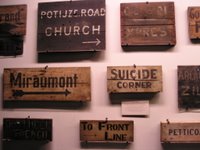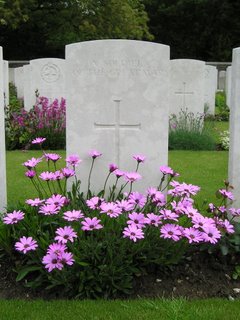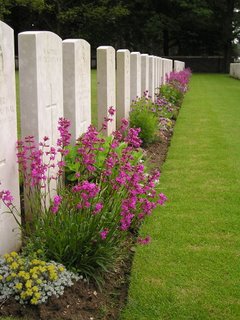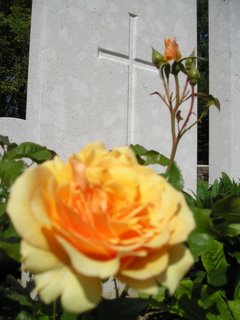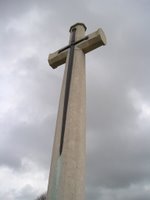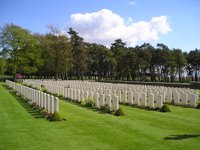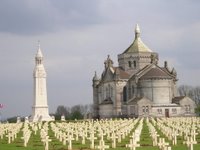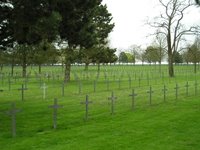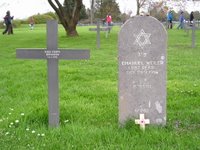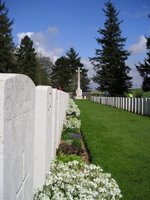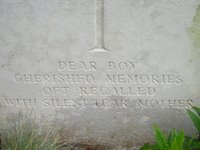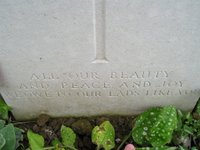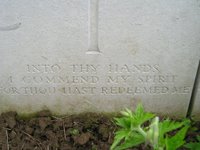In the last two months I have learned much about the first world war. I've been taught about it, read about it, listened to talks about it, and visited its battlefields. What I have enjoyed most about all of this learning are the new perspectives on what that war was like for the people of the time and for the "average" soldier.
On a couple of occasions, us guides have been bribed with a free dinner in return for our presence at presentations given at a British-owned B and B near the Newfoundland Memorial site (or, NewFOUNDland Park, as the British like to call it) in the Somme.
The first such presentation was on the subject of the German army in the Great War. Impressed upon us was the fact that the German army was a highly efficient, professional army, a very formidable enemy, which is, in part, why most of that war was spent in deadlock and lasted so long.
Coming from a country that was part of the Allied forces, it's easy to forget that the experience of the German people in that war would not have been all that different from that of our own people. What I particularly took away from that presentation was the point that after the war, Germany was given so very little land on which to bury their dead. This is why in many German cemetaries of the First World War you'll find mass graves. In fact, for unknown reasons, a much higher percentage of German soldiers just simply dissappeared without a trace.
The presenter ended the presentation by reading a translated version of a German poem that talked about the fact that mothers and wives and sisters of men lost during that war had absolutely no place to mourn. The war was fought in another land and with so many missing, they were left with absolutely nowhere to mourn their dead. No graves, no monuments, nothing. I've done a completely inadequate job of expressing it here, but it left quite an impression on me. When the politicians were done waging that war, the people of all countries were left equally devastated.
Last week we attended another presentation at "Avril's" (the name of the British woman who owns the B and B). It was a gorgeous evening on the Somme and we had dinner out in the garden. As usual, there were many British guests, many military, and on this particular evening, a contingent of Germans. When everyone had settled-in with their dessert, coffee, and/or other beverage, we enjoyed a presentation on the experience of the average soldier of the first world war. Because of all the German guests, the presentation was translated which, though making it quite a bit longer, was quite interesting because I got to see how many German words I could recognize!
Here are some of the more interesting points of this presentation:
-not all soldiers of the Great War were "boys" of 16, 17, and 18 years of age. The average age is probably a lot higher than you'd expect. All you have to do is roam through a war cemetary around here to see all sorts men from their late 20s into their 30s buried there. The fact that you may see so many young ones in the cemetaries was part of the harsh reality that the younger, less experienced ones were most likely to die.
-soldiers probably only spent from 10-25% of their time in the trenches and only about 20-some days in actual "battle." The rest of their time was spent in the rear areas on work crews, or on leave.
-half of those serving in the war were not infantry in the trenches. Armies need drivers and paramedics and bottlewashers and paper-pushers and all sorts of people other than soldiers on the ground in order to operate. Lots of those who served never saw battle or the trenches.
-lots of British came to Canada to enlist with the Canadian Corps because they'd be paid better than had they joined in Britain!
-Most people who went off to war came back. This is a vast generalization, but about 10% of those who went off to war never came back (though this figure fluxuates depending on the country).
These points were not raised in order to trivialize the experience of those men who served in that war, but rather to help us put things into perspective. We have such a tendency to look back on that time in history and think that there was "one experience" of those in war, when in fact, everyone's experience was different. We often think that it was off to war and then they sat in the muddy trenches for 4 long years. Again, I'm not trying to say that life for these men was fine and dandy, but rather that we tend to get a very warped view of things when we look back on history.
And certainly, the death toll was staggering for the time, and the fact that most men returned did not change the pain felt by those affected by the deaths of the 10% that did not make it. But at Vimy, for example, we'll get a lot of visitors who walk through the trenches and then pause thoughtfully and say something like: "think of the hundreds of thousands (or sometimes millions) who died here." We gently point out the fact that just under 4000 Canadian men died in the attack at Vimy, and that, within the context of war, that was actually not so bad. While the victory certainly came at great cost, the battle at Vimy was not a slaughter like the opening day of the battle of the Somme.
Don't even get me started on those popular views that the generals had no regard for human life and were just sitting in the rear areas having a lovely cup of tea, or that war was waged haphazardly. I've heard some very convincing arguments for the fact that war was complex and that it wasn't as simple as just deciding not to go to war. But like I said, don't get me started. Or if you're interested, you can get me started about it sometime, I'd love to talk your ear off. But for now, I'm rambling so I'll stop.
 Tonight I saw Depeche Mode in the Arras town square (with about 25,000 other people), fulfilling a 6 year dream. Gee, that doesn't sound as impressive as a LIFELONG dream, but it was still a good time. Here you can pretty much see as much as I could.
Tonight I saw Depeche Mode in the Arras town square (with about 25,000 other people), fulfilling a 6 year dream. Gee, that doesn't sound as impressive as a LIFELONG dream, but it was still a good time. Here you can pretty much see as much as I could.  Though all the cobblestone streets in Europe sure look nice and quaint for the visitors, they really aren't ideal for dancing in place. A very uneven surface below the feet makes this quite difficult.
Though all the cobblestone streets in Europe sure look nice and quaint for the visitors, they really aren't ideal for dancing in place. A very uneven surface below the feet makes this quite difficult. 


